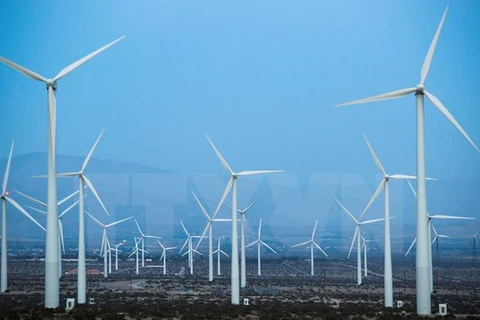Singapore (VNA) – Wong Kim Yin, CEO of SP Group, a state-owned power grid operator of Singapore, has said his group wants to build more connections to neighbouring countries to tap their greater potential for renewable energy.
Nations like Malaysia and Indonesia have large land for solar panels and enough wind to power turbines.
According to the CEO, building transmission lines to connect the countries and using renewable energy credits to facilitate power trading can allow Singapore to use clean power even if it can't produce it.
Legislation limits the use of Singapore and Malaysia's existing power connections only to emergencies, Wong said. A bilateral government agreement could immediately allow trading across those lines and start a movement toward wider international connections, he said.
Apart from building more connections to neighbouring countries, Wong underlined some measures to promote the use of clean energy such SP Group’s speeding up the transition to electric vehicles in Singapore by building 1,000 charging stations by the end of 2020, from about 200 now.
Singapore Minister of Trade & Industry Chan Chun Sing last week included regional power grids as one of four measures the country will explore to help decarbonise its power sector, which is almost entirely reliant on imported natural gas.
Also last week, Malaysia's Energy Minister Yeo Bee Yin said the nation is in discussions with Singapore about cross-border power supplies, and expects to complete 550 megawatts of new grid connection capacity this year and a similar amount next year.
The idea of connecting power plants and customers across Southeast Asia has been pursued for more than 20 years, but stymied by issues including lack of government coordination and infrastructure funding./.
Nations like Malaysia and Indonesia have large land for solar panels and enough wind to power turbines.
According to the CEO, building transmission lines to connect the countries and using renewable energy credits to facilitate power trading can allow Singapore to use clean power even if it can't produce it.
Legislation limits the use of Singapore and Malaysia's existing power connections only to emergencies, Wong said. A bilateral government agreement could immediately allow trading across those lines and start a movement toward wider international connections, he said.
Apart from building more connections to neighbouring countries, Wong underlined some measures to promote the use of clean energy such SP Group’s speeding up the transition to electric vehicles in Singapore by building 1,000 charging stations by the end of 2020, from about 200 now.
Singapore Minister of Trade & Industry Chan Chun Sing last week included regional power grids as one of four measures the country will explore to help decarbonise its power sector, which is almost entirely reliant on imported natural gas.
Also last week, Malaysia's Energy Minister Yeo Bee Yin said the nation is in discussions with Singapore about cross-border power supplies, and expects to complete 550 megawatts of new grid connection capacity this year and a similar amount next year.
The idea of connecting power plants and customers across Southeast Asia has been pursued for more than 20 years, but stymied by issues including lack of government coordination and infrastructure funding./.
VNA





















